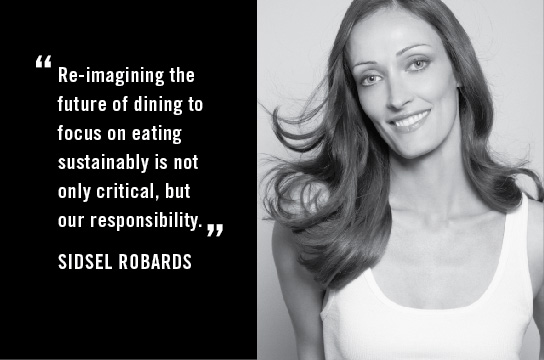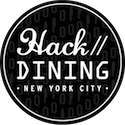Guest post by Sidsel Robards, Co-founder, NY Sun Work’s Greenhouse Project. The views expressed here are solely those of the author and do not reflect the views of Food+Tech Connect.
Modern agriculture has become the largest consumer of land and water on the planet, the cause of most water pollution, and the source of at least a fifth of the world’s greenhouse gas emissions. We have eaten 90% of the fish in our oceans; while at present we raise approximately 50 billion land animals for consumption every year. Too many people don’t think about what goes into the production of the food they eat, the impact it has, and why they should care. We buy, waste and trash more food than we care to imagine on a daily basis and yet globally, people are starving.
Re-imagining the future of dining to focus on eating sustainably is not only critical, but our responsibility. I believe that educating our next generation to think outside the box in terms of technology and design can help us re-imagine the future of our food supply, and in return, have a profound impact on our environment. A real difference will be felt when the majority of people decide to buy not only food that is sourced sustainably, but food that is free from chemicals and genetic modifications. While a portion of global citizens are growing this type of food, more of us need to grow what we call “sustainable minds” by educating both ourselves and the next generation of consumers to make informed choices about the impact our daily lives have on the world.
At NY Sun Works we have set out to build a new kind of science lab for our school. We install rainwater catchment tanks to provide all the water for hydroponic growing systems; we put in a fish farm not just to grow fish, but to start a conversation about the oceans. We built an energy corner where kids can convert their own energy into electricity; we put in composting to begin a conversation about waste; and a high tech computer system that collects greenhouse data. We call our curriculum ” a world of systems” because all these systems give the students an opportunity to learn not just about individual systems, but about their city and world as a system. Instead of saying “you have to eat healthy,” we look at the whole body as a system, and ask what that system needs to thrive.
We have set a goal of building 100 hydroponic educational school science labs by 2020. As we reach this goal and go beyond, we envision schools as viable players who will be able to contribute to the supply chain in NYC by partnering with neighborhood restaurants; or, as we are already doing at some NY Sun Works partner schools, growing crops for senior citizens who have limited access to quality produce.
The huge demand for sustainable, local food has arrived, and as more and more people move to urban environments, vertical farming will continue to evolve and become part of the solution to our food supply systems.
We’d love to see restaurants, bars and even private individuals take on this trend by easily growing their own hydroponic crops like micro greens, lettuces and herbs. New technologies will allow people to do so on rooftops, and perhaps — more feasibly for some — in apartment or restaurant basement farms, with grow lights and the ability to produce specialized crops for harvest and immediate use. Massive growing walls could make bars beautiful and green, while providing fresh herbs for garnishing cocktails.
None of these are exactly new ideas, but it is very exciting to see where it is all going as more innovators are working on these solutions. The trick will be to find a way for scientists, business owners, private individuals and most importantly policy makers to come together and make a lasting impact. The solutions we come up with now will dictate the well being of our future as a species. The planet will be fine, but will we?
Hacking Dining is online conversation exploring how we might use technology and design to hack a better future for dining. Join the conversation between June 2-30, and share your ideas in the comments, on Twitter using #hackdining, Facebook, LinkedIn or Tumblr.
________________
 Sidsel is the co-founder of NY Sun Works’ Greenhouse Project initiative which uses hydroponic farming technology to educate K-12th grade students and teachers about the science of sustainability. Prior to The Greenhouse Project, Sidsel enjoyed a successful career working as an international model. Born and raised in Denmark, she now lives in New York City with her husband and their children, who attend public school.
Sidsel is the co-founder of NY Sun Works’ Greenhouse Project initiative which uses hydroponic farming technology to educate K-12th grade students and teachers about the science of sustainability. Prior to The Greenhouse Project, Sidsel enjoyed a successful career working as an international model. Born and raised in Denmark, she now lives in New York City with her husband and their children, who attend public school.




